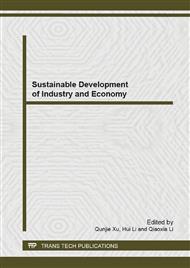[1]
Yan, J., and Li, L.: Multi-objective optimization of milling parameters – the trade-offs between energy, production rate and cutting quality', Journal of Cleaner Production, 2013, ", (0), pp.1-10.
DOI: 10.1016/j.jclepro.2013.02.030
Google Scholar
[2]
Qian, B., Wang, L., Hu, R., Wang, W. -L., Huang, D. -X., and Wang, X.: A hybrid differential evolution method for permutation flow-shop scheduling, The International Journal of Advanced Manufacturing Technology, 2008, 38, (7-8), pp.757-777.
DOI: 10.1007/s00170-007-1115-8
Google Scholar
[3]
Luo, H., Du, B., Huang, G.Q., Chen, H., and Li, X.: Hybrid flow shop scheduling considering machine electricity consumption cost', Int J Prod Econ, 2013, ", (0), pp.1-17.
DOI: 10.1016/j.ijpe.2013.01.028
Google Scholar
[4]
Mouzon, G., Yildirim, M.B., and Twomey, J.: Operational methods for minimization of energy consumption of manufacturing equipment, International Journal of Production Research, 2007, 45, (18-19), pp.4247-4271.
DOI: 10.1080/00207540701450013
Google Scholar
[5]
Mouzon, G., and Yildirim, M.B.: A framework to minimise total energy consumption and total tardiness on a single machine, International Journal of Sustainable Engineering International Journal of Sustainable Engineering, 2008, 1, (2), pp.105-116.
DOI: 10.1080/19397030802257236
Google Scholar
[6]
Zhang, L., Li, X., Gao, L., and Zhang, G.: Dynamic rescheduling in FMS that is simultaneously considering energy consumption and schedule efficiency, The International Journal of Advanced Manufacturing Technology, 2013, pp.1-13.
DOI: 10.1007/s00170-013-4867-3
Google Scholar
[7]
Fang, K., Uhan, N., Zhao, F., and Sutherland, J.W.: A new approach to scheduling in manufacturing for power consumption and carbon footprint reduction, J Manuf Syst, 2011, 30, (4), pp.234-240 %\ 2012-2012-2010 2013: 2050: (2000).
DOI: 10.1016/j.jmsy.2011.08.004
Google Scholar
[8]
Li, C., Tang, Y., Cui, L., and Li, P.: A quantitative approach to analyze carbon emissions of CNC-based machining systems, J Intell Manuf, 2013, pp.1-12.
DOI: 10.1007/s10845-013-0812-4
Google Scholar
[9]
NDRC: 2011 Baseline Emission Factors for Regional Power Grids in China, (2011).
Google Scholar
[10]
Liu, F.: Energy performance of mechanical processing system and application, (Machinery Industry Press, 1995. 1995).
Google Scholar
[11]
Shaonong, M.: Machinery Processing Technical Handbook, (Machinery Industry Press, 1992. 1992).
Google Scholar
[12]
Rajemi, M.F., Mativenga, P.T., and Aramcharoen, A.: Sustainable machining: selection of optimum turning conditions based on minimum energy considerations, Journal of Cleaner Production, 2010, 18, (10), pp.1059-1065.
DOI: 10.1016/j.jclepro.2010.01.025
Google Scholar
[13]
Deb, K., Pratap, A., Agarwal, S., and Meyarivan, T.: A fast and elitist multiobjective genetic algorithm: NSGA-II, Evolutionary Computation, IEEE Transactions on, 2002, 6, (2), pp.182-197.
DOI: 10.1109/4235.996017
Google Scholar


